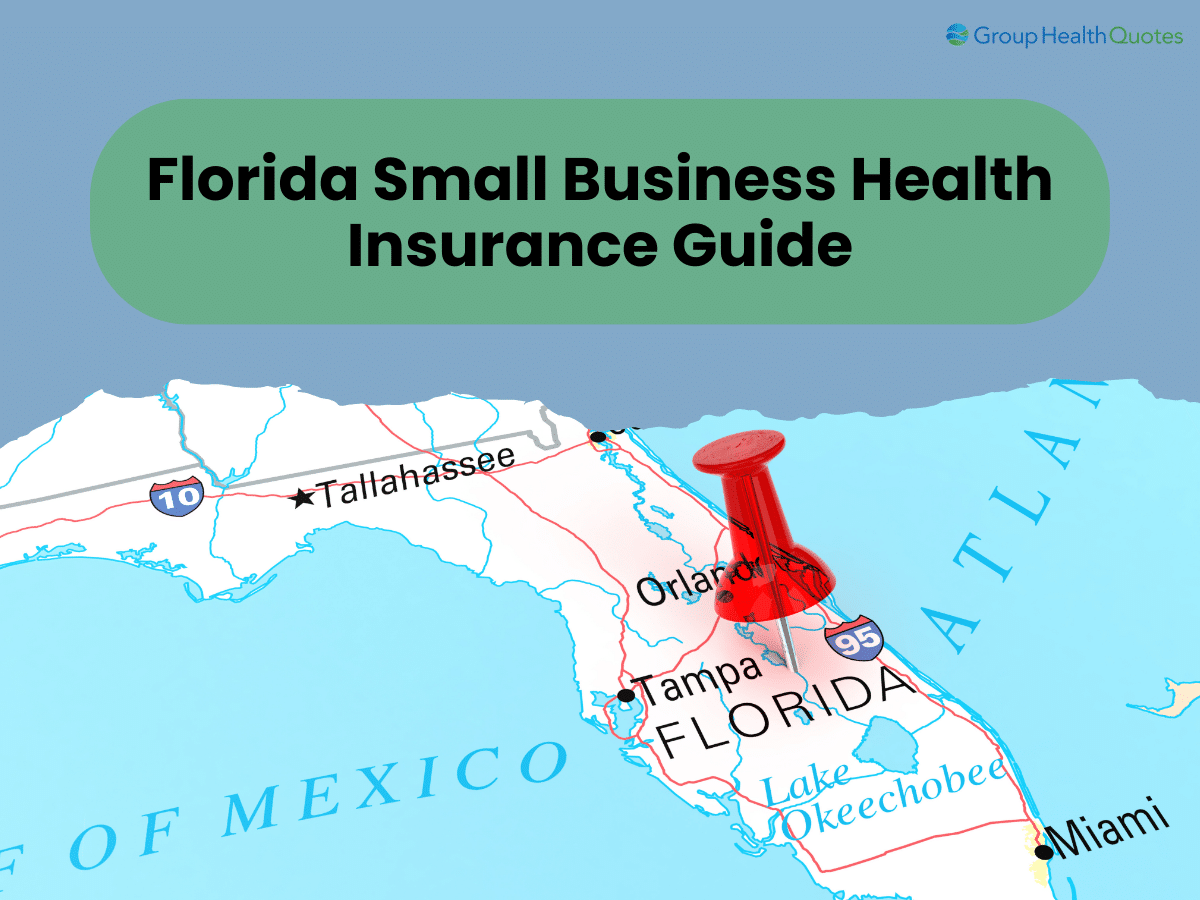Let’s face facts—as healthcare costs continue to rise in Florida there’s never been a bigger reason for company owners to invest in small business health insurance for their team.
But how do you know which type of coverage to choose?
This guide will help you navigate the health insurance options offered to small businesses in Florida. Here’s what you’ll learn:
- The various types of group health insurance plans and which ones may be ideal for your organization.
- Affordable alternatives to traditional coverage to ensure your staff has access to healthcare.
- How small businesses in Florida can benefit from tax rebates and initiatives that cut their health insurance expenses.
- Tips for selecting the best providers and average premium costs.
Let’s get started.

Florida Small Business Health Insurance Options
For small business operating out of Florida, there a number of group health insurance options offering comprehensive employee benefits:
Private Group Health Plans
Private group health insurance plans are policies offered by private insurance companies. They offer benefits through a variety of different plan types. These plans are very customizable. They give business owners the flexibility to choose coverage options fitting their employees’ and their own needs.
SHOP Marketplace Plans
The Small Business Health Options Program, also known as SHOP is an online marketplace created exclusively for small businesses. It was developed in aims to provide small companies with health insurance for an affordable price. Additionally, the plans that SHOP offers to qualifying businesses provide access to federal tax credits, which adds an additional component of affordability.
To qualify for SHOP Marketplace plans your business must:
- Have between 1 to 50 full-time equivalent employees (FTEs).
- Offer coverage to all of the full-time employees.
- Enroll at least 70% of the employees to the offered insurance plan.
- Have an office or employee work site within the state whose SHOP you want to use.
How Does Small Business Health Insurance Work?
Step #1: Employers decide which types of plan(s) they want to offer their employees. Keep in mind that most insurance companies allow businesses to offer multiple plans giving employees the option to pick what best suits their healthcare needs’.

Step #2: When it comes to payment, employers and employees typically share the cost of monthly premiums. Employers will pay a portion of the premium (generally around 50%), and the remaining portion is deducted from employees’ paychecks.
Step #3: As far as enrollment goes—unlike individual health insurance which has a set Open Enrollment Period, group health enrollment is based on your initial enrollment date. This means that your company can enroll at any point during the year, and your renewal date will generally be one year from your initial enrollment.
If employees wish to make changes to their selected health insurance plan they will have to wait until the next enrollment period unless they experience a qualifying event. Qualifying events include things like marriage, the birth of a child, or the death of a spouse.
Types of Small Business Health Insurance Plans in Florida
When selecting a group health plan, business owners can choose from numerous plan types, each with their own unique perks:
Health Maintenance Organization (HMO): These plans typically offer lower rates and compel employees to use a specified network of physicians. A primary care physician (PCP) is required for referrals to specialists.
Preferred Provider Organization (PPO): PPO plans allow employees to see out-of-network providers for greater costs and do not require referrals. Employees benefit from greater flexibility, even though these plans are typically more expensive.
Exclusive Provider Organization (EPO): EPO plans combine elements of HMO and PPO plans. Employees don’t need referrals to see specialists, but must stay inside the plan’s network to be covered, except in emergencies.
Point of Service (POS): POS plans, like HMOs, need a primary care physician reference for specialist visits, but allow for some out-of-network access at a higher expense, combining HMO and PPO benefits.
High Deductible Health Plans (HDHP) with Health Savings Accounts (HSA): While these plans have lower monthly premiums, they tend to have higher deductibles. When combined with an HSA, they allow employees to save pre-tax funds for medical bills, making them a desirable choice for employers with cost-conscious employees.
Alternatives to Traditional Health Coverage in Florida
For companies that don’t need a full group health plan, there are alternatives to standard health insurance that still give employees access to healthcare:
Individual Coverage Health Reimbursement Arrangement (ICHRA): An ICHRA enables businesses to provide a monthly allowance that employees can use to buy the individual health insurance plan of their choosing. This option is quite versatile, as employees can select the programs that best suit their needs.
Qualified Small Employer Health Reimbursement Arrangement (QSEHRA): QSEHRA is designed for organizations with less than 50 employees and provides tax-free reimbursements for individual health insurance and some medical expenses. It’s a reasonable solution for small firms who don’t provide typical group insurance.
Short-Term Health Plans: These plans provide temporary, basic coverage for up to 12 months. They can be useful for organizations or employees who require quick but limited coverage; nevertheless, they lack many of the benefits of ACA-compliant policies.
Health Sharing Programs: Although they are not insurance, health sharing programs provide low-cost, limited coverage by pooling members’ resources to pay for medical expenses. The ACA does not regulate these programs, and they might not pay for all costs.
Association Health Plans (AHPs): AHPs give small businesses in particular trade associations or industries the opportunity to band together to get group insurance at a discounted rate. For companies with associations dedicated to their industry, this may be a more cost-effective option.
Tax Credits and Financial Programs For Small Businesses
Florida small businesses can take advantage of a number of tax incentives and financial initiatives to lower the cost of health insurance:
Small Business Health Care Tax Credit: When offering SHOP marketplace plans, companies with less than 25 full-time employees may be eligible for a federal tax credit equal to up to 50% of premium costs. The company must pay average annual salaries below a certain threshold and cover at least 50% of employee premiums in order to qualify.
Contributions to Employee Health Savings Accounts (HSAs): For companies that provide HDHPs, making contributions to employees’ HSAs can be a tax-advantage method of covering medical expenses. Tax deductions for employer contributions to HSAs can lower taxable income.
Tax-Free Reimbursement through QSEHRA and ICHRA: Small companies can provide tax-free reimbursement for employees’ health insurance premiums and specific medical costs through QSEHRA and ICHRA, enabling flexible and reasonably priced coverage options.
Top Small Business Health Insurance Providers in Florida
For small businesses in Florida that offer group health insurance, it’s essential to choose a trustworthy provider. Here are the top small business health insurance providers in the state of Florida:
Florida Blue (Blue Cross Blue Shield of Florida): One of the most popular options for small businesses, Florida Blue provides a wide range of HMO and PPO plans along with a vast provider network.
Aetna: Well-known for its reasonably priced plans, Aetna offers coverage options that include telehealth, wellness perks, and wide network access throughout Florida.
Cigna: Digital health services and preventive care are the main focuses of Cigna’s health insurance. Their plans appeal to small firms and their staff because they provide flexibility and extensive support services.
Humana: A pioneer in Medicare coverage, Humana also provides individual and group plans focusing on wellness and preventive care. For small business needs, Humana offers a variety of flexible plan options.
United Healthcare: UnitedHealthcare provides plan alternatives that are ideal for Florida’s small businesses, ranging from low-budget to comprehensive options, thanks to its extensive provider network and cutting-edge digital capabilities.
The Cost of Small Business Health Insurance in Florida
The monthly and annual expenses of group health insurance for small businesses can vary greatly depending on a variety of factors. While premiums may be greater or lower based on the plan, coverage level, and employee demographics, here are the most common factors that influence costs:
- Business Size: larger firms often get better rates since they have a bigger pool of participants. On the other hand, smaller groups may pay more per person.

Group of diverse business professionals gathered around a table. - Employee Demographics: The age, location, and overall health profile of your employees can all affect cost. In general, older or higher-risk groups typically raise monthly premiums.
- Plan Type: Premiums are affected by the kind of health plan chosen (HMO, PPO, EPO, POS). Generally, plans with greater flexibility, such as PPOs, have higher rates, while more restrictive plans, like HMOs, are usually less costly.
- Coverage Level: Plans with lower deductibles and out-of-pocket maximums typically have higher premiums, whereas high-deductible plans may have lower monthly costs, but raise employee spending when seeking care.
- Employer Contributions: The amount that an employer contributes to premiums influences overall expenditures. Higher employer contributions cut monthly expenditures for employees while increasing the employer’s financial responsibility.
Key Health Insurance Regulations in Florida
There are many regulations in Florida when it comes to health insurance, all of which are essential protections and standards for small company owners:
Pre-existing Condition Protections: The ACA prohibits insurers from denying coverage or charging higher premiums based on pre-existing conditions, assuring equal access to healthcare.
Essential Health Benefits: Preventive care, maternity, mental health services, and prescription medicines are examples of essential health benefits that must be included by all ACA-compliant plans in Florida.
Age-Based Pricing: Florida lets insurers adjust insurance premiums based on age, which means that older employees may pay higher premiums. Qualifying companies or people may be eligible for ACA subsidies that help cover these costs.
Minimum Participation Requirements: Some group health plans need a specific percentage of employees to enroll. Employers should always be sure to evaluate plan specifics to ensure compliance.
Get Instant Quotes and Expert Help with GHQ
Group-Health-Quotes.com (GHQ) offers an easy approach to finding the perfect coverage for your workforce. When working with GHQ, you’ll get access to:
- Free, Instant Quotes, We make it easy to find a plan that fits your budget and company needs.
- Our Plan Comparison Tool: Compare multiple plans side by side, to ensure that the plan you choose includes the benefits your employees want.
- Expert Insurance Agent Assistance: Licensed agents are available to answer questions and walk you through the selection process,
To learn more about our user-friendly platform, or to get your free, instant quote, just visit our homepage, or fill out a quick form.
Secure Your Business’s Future with Health Coverage in Florida
While the cost of health coverage is on the rise in the sunshine state, don’t fret, because the perfect plan for your team still exists! When shopping for coverage for your small business it’s important to find a plan that balances affordability and comprehensive coverage. Luckily for you and your team, GHQ is here to help you do just that.
Ready to take the next steps in securing the future of your business and employees? Look no further. Just visit Group-Health-Quotes.com, and fill out a form or call us directly at (888)-571-0291.
Looking for more informational resources and articles aimed at helping small businesses save money and run a smooth business operation? Check out our resource library today!
